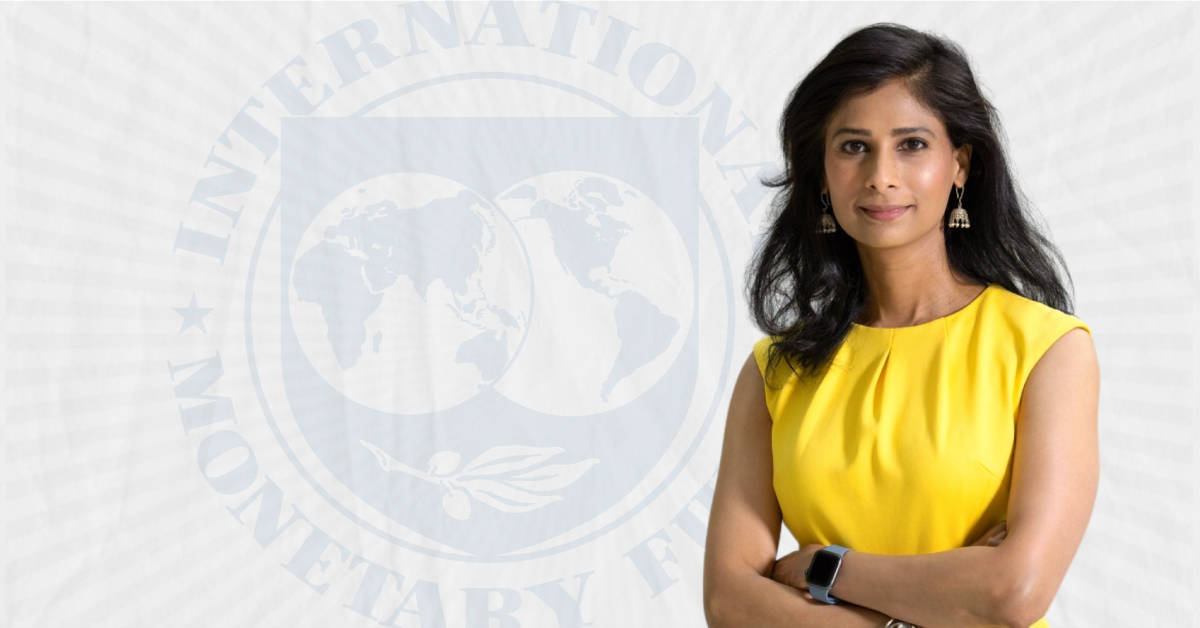A Journey Rooted in Curiosity
Gita Gopinath’s story begins in the bustling streets of Kolkata, India, where she was born in 1971 into a family that valued education. Her early academic achievements hinted at the brilliance to come. With an insatiable curiosity for understanding how the world’s economies operated, she pursued her passion for economics, earning her undergraduate degree from Lady Shri Ram College, Delhi. Following that, she embarked on an academic journey that would take her across continents—from Delhi School of Economics to the University of Washington, and eventually, Princeton University, where she earned her PhD in international economics.
Gopinath’s early focus on international trade and macroeconomics would shape the direction of her groundbreaking work in later years. Her academic career took off at Harvard University, where she became the second-ever Indian woman to achieve tenure in the Economics Department. Here, she researched the intricacies of financial crises, trade dynamics, and exchange rate volatility, a body of work that would later inform her critical roles in shaping global policy.
The Groundbreaking Role at the IMF
In 2019, Gita Gopinath became the first woman to hold the position of Chief Economist at the International Monetary Fund (IMF), a position that placed her at the heart of global economic decision-making. Her appointment was historic—not only because of her gender but also because of the responsibility that came with leading the economic strategies of the world’s financial overseer.
Gopinath assumed this role at a particularly challenging time, just months before the global pandemic would bring the world economy to its knees. Her strategic guidance proved critical in helping nations navigate the economic crisis sparked by COVID-19. One of her most influential contributions during this time was the formulation of policies aimed at safeguarding vulnerable economies. She advocated for stimulus measures that prioritized liquidity and support for sectors hit hardest by the pandemic.
Leading the Way During the COVID-19 Pandemic
One of the defining moments of Gopinath’s tenure was her leadership in the creation of the now-famous “Pandemic Paper,” published as part of the IMF’s World Economic Outlook. This paper didn’t just present numbers and forecasts—it laid bare the crucial link between economic recovery and equitable vaccine distribution. Gopinath argued that without global access to vaccines, the pandemic would drag on and continue to strain economies worldwide. Her paper urged nations to collaborate and share resources, pushing the conversation beyond national interests and focusing on a more collective, humane approach.
In her view, a prolonged pandemic could shave off an estimated $9 trillion from global GDP by 2025. Her call for equitable vaccine distribution was not only a moral imperative but an economic necessity to restore global stability. She was clear in her messaging: the global economy’s fate was tied to how well it could protect and heal its people.
Beyond the Pandemic: Tackling Broader Economic Issues
Gopinath’s influence at the IMF extended far beyond the pandemic. She led the charge on addressing the looming debt crisis in many low-income nations, advocating for initiatives like the Debt Service Suspension Initiative (DSSI). By 2021, the DSSI had freed up over $12 billion in savings for some of the world’s poorest countries, offering them temporary relief as they struggled to meet their financial obligations during the global downturn.
Her work also touched on climate change, where she made it clear that environmental sustainability could no longer be divorced from economic planning. In her view, the economic impacts of climate change would disproportionately affect developing nations, further exacerbating global inequalities. She championed policies that included both climate mitigation and adaptation strategies, arguing that future financial stability depended on environmental responsibility.
The Return to Academia
After her term at the IMF ended in 2022, Gopinath returned to Harvard, resuming her role as a professor. However, her departure from the IMF did not mark the end of her influence on global economic policy. She continued to advise on critical issues facing the global economy, drawing on her experiences at the IMF to inform future academic and policy work. Whether speaking on debt relief for developing nations or the economic risks of climate inaction, Gopinath’s voice remains one of the most respected in economic circles.
A Modest, Yet Monumental Legacy
Gita Gopinath’s legacy is not just about the positions she’s held, but the impact she’s had. Her tenure at the IMF came during one of the most turbulent economic periods in modern history, and she rose to the challenge with a combination of deep expertise and compassionate pragmatism. Her achievements show how global cooperation, informed by data and human empathy, can help the world navigate its most pressing crises.
Her work continues to inspire women in economics and beyond, serving as a testament to what’s possible when vision, education, and action come together. As she continues to shape global policies, Gopinath remains a figure who redefines what it means to lead in the interconnected world of global economics.



